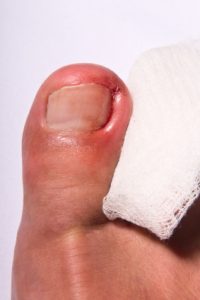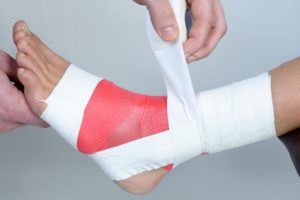What is Podiatry?
Podiatry is the health specialism dealing with foot, ankle and leg problems. Podiatrists in the U.K. undertake a specialised degree in Podiatry before becoming registered with the Health and Care Professions Council.
Alan Phelan is a highly experienced HCPC registered podiatrist who has undertaken extensive additional post-graduate training.

Alan provides assessment and treatment for all foot and ankle problems and offers a variety of specialist podiatry treatments. Some examples are:-
Ingrown toe nails: these are painful nails which protrude into the surrounding skin and can cause significant inflammation and infection. Many ingrown nails can be treated in one appointment under local anaesthesia to minimise discomfort.

Problem toe nails: recurrent ingrown nails, thickened and deformed nails can all be treated with nail surgery under local anaesthesia to permanently prevent problems.
Verrucae and warts: we offer minor skin surgery solutions for problem verrucae and warts. Treatments include cryosurgery, verruca needling and minor surgical removal, all of which can be performed under local anaesthesia to minimise discomfort.

Forefoot pain: this can range from problem toes and bunions to nerve entrapment and painful joints. Once we have established the diagnosis and cause, a variety of treatments can be offered ranging from footwear and surgical advice to therapeutic injections and insoles.

Heel and arch pain: these common complaints can be painful to live with and stubborn to settle. It is important to thoroughly assess the problem and confirm the cause. A variety of treatments can be offered ranging from taping and physical therapies to therapeutic injections and insoles.

Ankle pain: the tendons, ligaments and joints around the ankle can be a common cause of pain (especially after injury) and can limit the sports and recreational activities you enjoy. We often use combinations of treatments such as taping, physical therapies, therapeutic injections and insoles to get you back to activity as quickly as possible.

Painful joints: the foot is a complicated part of the body and it’s joints can be a source of pain and disability when they start to wear out, become “arthritic” or inflamed. A number of treatments can help painful foot joints such as therapeutic injections and insoles; we are also able to advise patients about whether surgery might be a suitable option for them.

What will happen at my appointment?
Your experience with us will usually start with either a standard appointment or an extended appointment.
Please bring along full details of any current or past medical and surgical conditions and any medicines you are currently taking. We will discuss these issues with you in case they may be relevant to your foot problem or to a treatment we may be considering for you.
We will examine your feet to assess their health status then examine your presenting foot or ankle problem. Once we have a likely diagnosis we can discuss any further tests that may be needed and the likely treatment needs and costs with you.
Before proceeding with any treatment we will discuss the benefits and risks with you and gain your consent.
The treatment we start at the first appointment will depend upon the nature of your problem. Straightforward or urgent treatments may be undertaken at that appointment but if a more complex treatment is needed then a further appointment or course of treatment may be needed.
If simpler ongoing or repeated “chiropody” type treatments are expected we may sometimes direct you to local general practice podiatry colleagues as a more cost-effective option.